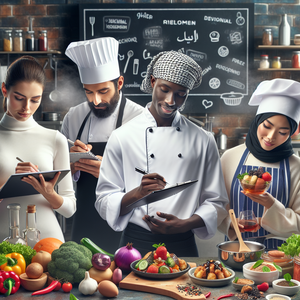Culinary Adventures: Learning French Through Cooking

Cooking is a universal language that transcends borders, and it offers an excellent platform for learning. When English speakers engage in cooking classes conducted in French, they are not merely following recipes; they are immersing themselves in a cultural experience that enriches their understanding of the language. Ingredients, techniques, and culinary traditions come alive through hands-on practice, enabling learners to grasp vocabulary in context. For instance, terms like "émincé" (sliced), "sauté" (to fry lightly), and "mirepoix" (a mix of diced carrots, celery, and onions) become part of the learner's lexicon as they physically engage with the cooking process. Moreover, as they ask questions or share their cooking experiences in French, they practice conversational skills that are often overlooked in traditional classroom settings. This active engagement reinforces memory retention and makes the learning experience more enjoyable.
Personal Stories from Chefs
To illustrate the power of culinary language learning, we spoke with several chefs who teach French cooking classes to English speakers. Chef Marie, who runs a popular cooking school in Paris, shared her experience: "When my students learn to make a classic coq au vin, they not only learn the recipe but also the history behind it. We discuss the regional variations, the importance of wine in French cuisine, and the stories of French families. This context enriches their vocabulary and makes the language come alive." Chef Antoine, who teaches in New York City, emphasized the role of interactive learning: "Cooking is tactile and engaging. As students measure ingredients or chop vegetables, they practice vocabulary related to food and cooking. They are not just passive learners; they are active participants in their own learning process." These chefs exemplify how culinary education can foster a connection to the language that is both personal and profound.
Cultural Insights Through Culinary Exploration
Learning French through cooking also opens doors to cultural insights that go beyond the language itself. Each dish tells a story, reflecting the traditions, history, and regional diversity of France. For example, while preparing a classic ratatouille, learners can delve into the Provençal way of life, discussing the significance of local produce and the Mediterranean climate. Moreover, food is often linked to social gatherings and celebrations in French culture. By exploring recipes for various French festivities—like crêpes for Candlemas or galette des rois for Epiphany—students gain a deeper appreciation of how language and culture intertwine. This cultural context not only enriches their vocabulary but also enhances their understanding of the nuances of the language. The experience of creating and sharing food becomes a bridge to understanding the French way of life.
Practical Tips for Learning French Through Cooking
For those interested in embarking on this culinary language adventure, here are some practical tips to get started: 1. **Join a Cooking Class**: Look for local cooking schools that offer classes in French. Engaging with a native speaker in a hands-on environment will boost your confidence and language skills. 2. **Follow French Recipes**: Start with simple French recipes and try to follow them in French. Use online resources or cookbooks to familiarize yourself with culinary terms and phrases. 3. **Watch Cooking Shows**: Tune into French cooking shows or YouTube channels. Listening to chefs describe their techniques in French can improve your listening skills while providing visual context. 4. **Host a French-themed Dinner**: Gather friends for a French dinner night where everyone prepares a dish using French recipes. This provides a fun way to practice language skills in a social setting and promotes a shared culinary experience. 5. **Keep a Culinary Journal**: Document your cooking experiences in French. Write about the recipes you tried, the ingredients you used, and any new vocabulary you learned along the way. This personal reflection reinforces language learning.
Learning French through cooking is a flavorful and immersive way to acquire language skills while appreciating the richness of French culture. By engaging with culinary arts, English speakers can break down the barriers of language learning, making it a joyous and memorable experience. As the stories of chefs like Marie and Antoine illustrate, the kitchen can be a classroom filled with laughter, creativity, and delicious moments. So grab your apron, turn on some French music, and embark on this delightful culinary adventure—your taste buds and language skills will thank you!
Culinary Instructor (French Cuisine)
Culinary schools, community centers, and private cooking studios
Core Responsibilities
Design and deliver engaging cooking classes focused on traditional French recipes and techniques.
Incorporate language instruction into cooking sessions, helping students learn culinary vocabulary in French.
Evaluate student progress and provide constructive feedback to enhance both cooking skills and language acquisition.
Required Skills
Proficiency in French, with strong communication skills in both English and French.
Experience in culinary arts, preferably with a focus on French cuisine.
Ability to create a dynamic and interactive classroom environment.
Food and Culture Writer
Food magazines, online culinary publications, and blogs
Core Responsibilities
Research and write articles that explore the intersection of food, culture, and language, particularly focusing on French culinary traditions.
Conduct interviews with chefs and culinary experts to gather insights and personal stories related to French cuisine.
Develop engaging content for websites, magazines, and blogs that educates readers on culinary techniques and cultural significance.
Required Skills
Strong writing and storytelling abilities, with a passion for food and cultural exploration.
Familiarity with French culinary terminology and practices.
Experience in journalism, blogging, or content creation.
Culinary Tour Guide (French Cuisine)
Culinary tourism companies, local tourism boards, and travel agencies
Core Responsibilities
Lead culinary tours that explore French cuisine and culture, providing participants with insights into local food markets, restaurants, and cooking techniques.
Discuss the history and cultural significance of various French dishes, enhancing the language learning experience for participants.
Organize tasting events and cooking demonstrations as part of the tour itinerary.
Required Skills
Fluency in both French and English, with excellent interpersonal skills.
Strong knowledge of French culinary traditions and the ability to convey that knowledge engagingly.
Experience in hospitality or tourism.
Recipe Developer (Bilingual Focus)
Food brands, cooking magazines, and culinary websites
Core Responsibilities
Create and adapt recipes that highlight French culinary techniques while ensuring they are accessible to an English-speaking audience.
Write clear and informative recipe instructions in both French and English, incorporating relevant culinary terminology.
Collaborate with chefs and food bloggers to test and refine recipes for publication.
Required Skills
Strong culinary skills and experience in recipe development.
Bilingual proficiency in French and English, with a good understanding of culinary language.
Creative thinking and problem-solving skills in the kitchen.
Food Stylist (French Cuisine)
Food magazines, cookbooks, advertising agencies, and culinary production companies
Core Responsibilities
Prepare and style dishes for photography and video that showcase French culinary artistry.
Collaborate with food photographers and chefs to create visually compelling food presentations that tell a cultural story.
Stay updated on food trends and techniques in French cuisine to ensure styling is authentic and appealing.
Required Skills
Strong aesthetic sense and experience in food styling.
Familiarity with French culinary traditions and presentation styles.
Excellent communication skills, especially in a collaborative environment.


